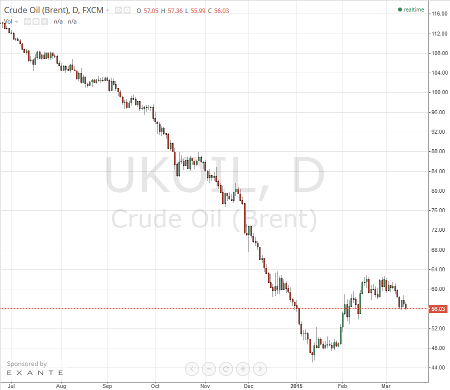Saudi oil and the volatility hypothesis
13th March 2015 16:45
by Lee Wild from interactive investor
Share on
After a well-documented plunge in the price of oil since last summer, both Brent crude and West Texas Intermediate (WTI) have bounced smartly off five-year lows. The recovery, however, is clearly fragile and new lows are a real possibility. But why has the oil market become so volatile? There is, it seems, an unlikely and controversial explanation.
Much of the conversation around the sudden sell-off in oil eight months ago has centred on North American frackers, or shale oil companies as the new swing producers. Goldman Sachs said as much last autumn. Crude prices will be capped for the foreseeable future, by their marginal production costs, so the argument goes.
Many believe it was Saudi Arabia's ultimately unsuccessful attempt to undermine so-called tight (shale) oil that caused the slump. The thinking is that frackers will re-enter the market as prices rebound to their respective marginal costs, and with high inventories, shale oil will limit price volatility. But this hypothesis hinges on the assumption that global demand growth has decelerated permanently.
Barclays has other ideas.
"We propose an alternative Volatility Hypothesis that we believe better explains current market dynamics and Saudi supply behaviour," says the bank's commodities research team, and it very much depends on the Saudis remaining the global swing producer and that it benefits from volatility. This last point, that Saudi may actively encourage crude oil price volatility, is by far the most controversial.
"Our Volatility Hypothesis better explains Saudi strategy and suggests a very different set of winners and losers," says Barclays. "The expansion of North American tight oil production forced Saudi Arabia from a policy of price stabilisation to one of increased market determination that has increased volatility sustainably.
"In our view, Saudi Arabia benefits from an enduring increase in volatility while other producers will be harmed."
That's because in the past, it was in Saudi interests to stabilise and slow the rise in crude prices to lessen the chance that consumers would switch to increasingly cheaper alternative fuels. Saudi has the world's largest reserves of conventional crude and lowest marginal extraction costs, so long-term profit maximisation involves getting as much oil out of the ground as possible and sold at the highest price before alternatives take over.
Barclays argues that Saudi did this by expanding production capacity, while keeping a buffer to cope with any supply/demand shock. "Through this price smoothing policy, Saudi Arabia maintained a relatively constant market share of global production amid rising prices (revenues), while simultaneously minimising long-run demand destruction."
However, shale oil supply is up and global demand growth has slowed, so Saudi's volatility absorption policy began to erode both market share and revenue. Higher crude prices would also encourage long-term demand destruction, new unconventional supplies, and alternative energy sources, thus affecting profit maximisation. A change in policy was needed.
But why is volatility advantageous to Saudi?

Higher price volatility means marginally profitable oil investments are unlikely to be pursued, which restricts supply and increases the expected price of oil. That's why a sustained rise in the volatility of oil prices does benefit a low cost producer like Saudi in the long run.
Think of it in terms of an option trade, says Barclays. All investment decisions are call options (the right to buy the underlying commodity at an agreed price (strike price)) with the strike price set at the marginal cost of production.
Imagine Saudi is long a Brent call option at $20 a barrel and consider its benefit from selling a call option with a strike price just about the global marginal cost of production (about $70-$75). "The option the Saudis own is deeply in the money, so changes in volatility have little impact on its price, while changes in the underlying price of oil have a one-for-one impact," says Barclays. "But the call option it sells is roughly a 50-delta option whose value moves more proportionally with volatility."
"By pursuing market share (rather than protecting profit margins), the Saudis are effectively selling a call option with a strike near the global marginal cost of production. If price volatility rises as a result, the value of the option that the Saudis "sold" rises. Effectively, Saudi Arabia can reap the volatility risk premium paid by risk-averse investors in higher-cost oil fields.”
It also has an advantage over smaller, higher-cost producers who are less able to guarantee stable prices to consumers. Saudi can.
This article is for information and discussion purposes only and does not form a recommendation to invest or otherwise. The value of an investment may fall. The investments referred to in this article may not be suitable for all investors, and if in doubt, an investor should seek advice from a qualified investment adviser.